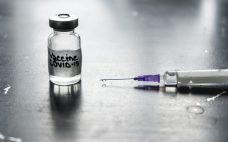Gilead’s Kite has won US FDA approval for Tecartus (brexucabtagene autoleucel), a CAR-T cell therapy for the treatment of mantle cell lymphoma (MCL). Tecartus becomes the third chimeric antigen receptor (CAR) T-cell therapy to be granted approval by the US Food and Drug Administration after Novartis’ Kymriah (tisagenlecleucel) and Kite’s Yescarta (axicabtagene ciloleucel), both of which were approved in 2017. Tecartus is designed to target CD19, a protein found in high amounts in cancerous B cells, and the regulatory decision…

Therapeutic Class
Novartis offering COVID-19 capacity but won’t play in vaccine space
Novartis has no plans to join its Big Pharma peers in developing a coronavirus vaccine but says it will continue supporting efforts to tackle the virus. Developing a vaccine is deemed key in the global fight against the novel coronavirus. As such, industry has mobilized to speed development efforts through the clinic, with numerous Big Pharma firms jumping on board. AstraZeneca is racing away in bringing its Oxford vaccine to fruition. J&J is pushing forwards with its adenovector-based vaccine. Pfizer…
With capacity assured and platform proven, hopes grow for J&J COVID vaccine
J&J is confident of the success and supply of its COVID-19 vaccine candidate after securing manufacturing capacity and receiving approval of Ebola vaccines based on the same adenovector technology. Johnson & Johnson’s candidate – SARS-CoV-2 vaccine, Ad26.COV2-S, recombinant – is set to enter Phase I/IIa studies later this month (see textbox). It is one of a number of coronavirus vaccines in development but according to the firm, the candidate’s potential for success has been bolstered by the verification of the…
Orchard licenses GSK cell line tech for gene therapy programs
Orchard Therapeutics says GSK’s cell line tech will reduce reliance on plasmids and speed gene therapy development. The UK gene therapy firm licensed GSK’s lentiviral stable cell line technology (LV-SCLT) this week. The plan is to use the cell line to produce OTL-103 – a candidate for Wiskott Aldrich syndrome – and OTL-300 – a therapy for transfusion-dependent beta thalassemia. Orchard spokeswoman Molly Cameron told Bioprocess Insider “We aren’t disclosing financial details around the deal, however this agreement aligns with…
Sarepta: ‘We have a voracious appetite for gene therapy manufacturing capacity’
Inhouse capabilities coupled with capacity at CDMOs including Thermo Fisher and Catalent have allowed Sarepta Therapeutics to rapidly advance its gene therapy pipeline, says management. Sarepta Therapeutics has 43 programs in its pipeline, the majority of which are gene therapies and gene editing-based products. Leading gene therapy candidates include SRP-9001 Micro-dystrophin for Duchenne muscular dystrophy [DMD] and SRP-9003 for limb-girdle muscular dystrophy (LGMD). To support these developmental programs, the firm adopted two years ago what it calls “a hybrid manufacturing…
Instant caRNA? Tesla touts RNA bioreactor it is developing with Curevac
Curevac and car maker Tesla claim their development RNA production tech is less labour intensive and more deployable than alternatives. The technology – described as a Bioreactor for RNA in vitro Transcription – allows the DNA templates from which the RNA is produced to be used multiple times. It is also automated, which Curevac and Tesla say will minimize handling steps and make manufacturing processes more robust. The firms contrast their technology with current systems, which involve “many separate manufacturing…
Nex-T up: Bristol-Myers using machine learning to optimize future CAR-T
Bristol-Myers Squibb says its next-generation CAR-T candidates, known as Nex-T, could offer faster and cheaper autologous cell therapies against multiple myeloma and lymphoma. Bristol-Myers Squibb (BMS) entered the chimeric antigen receptor (CAR) T-cell therapy space through the completion of its $74 billion acquisition of Celgene last November. Among the candidates BMS added to its pipeline were lisocabtagene maraleucel (liso-cel), an anti-CD19 targeting lymphoma, and idecabtagene vicleuce (ide-cel) being developed against multiple myeloma in partnership with Bluebird Bio, both in late-stage…
News of note: Sanofi’s €610 million vaccine boost
Sanofi will build a production site and an R&D facility near Lyon in efforts to make homeland France the center of its global vaccine efforts. The plant in Neuville sur Saône, north of Lyon, France, represents an investment of €490 million ($550 million). It will be modular in its design and dedicated to vaccine production and is being set up to respond to future epidemics. The R&D center in Marcy-l’Etoile, west of Lyon, represents €120 million and will look to…
Imperial College London takes RNA COVID vaccine into clinic
A vaccine candidate that allegedly turns cells in the body into ‘mini-antibody producing factories’ against COVID-19 has begun first-in-human clinical trials. The latest effort in combatting COVID-19 comes form the UK’s Imperial College London, with its vaccine candidate beginning Phase I trials this week. The vaccine is being developed through over £41 million ($51 million) of UK government funds and is based on a self-amplifying RNA technology. “The way the vaccine works is quite different from other approaches in that…
Spark on changing cell and gene regulatory expectations
Regulators are increasingly looking to industry to turn the science of cell and gene therapies into reproducible platform technologies, says Spark Therapeutics’ Diane Blumenthal. The advancements in the cell and gene therapy space were applauded throughout Xconomy’s virtual Xcelerating Philadelphia event last night as industry experts spoke about the increasing number of such therapies moving through the clinic and the hurdles that industry is rapidly knocking over. But challenges continue to exist, and in a panel focused on regulatory pathways,…










